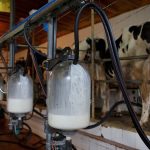
Milk New Zealand is a Chinese-owned company set up after the purchase of the Crafar farms.
During a livestream in July with one influencer, who has more than 28 million followers, Milk New Zealand sold more than 70,000 cartons of its specialised protein UHT milk in one minute.
The sales were the equivalent to 28 shipping containers of the cartons.
The identity of the influencer behind the UHT sale is being kept secret .
Milk New Zealand product general manager Roy van den Hurk said using popularsocial media stars on platforms like WeChat was a key part of Milk New Zealand’s strategic plan for China.
WeChat is reported to have 1.2 billion active monthly users, according to China’s internet giant Tencent.
Van den Hurk said using social media personalities to sell products reflected the much more sophisticated use of technology in China.
“Social media over there is very sophisticated compared to here. They almost missed computers and went straight to phones,” he said.
The younger generation were particularly tech-savvy, van den Hurk said.
China’s influencers were almost like rock stars, he said.
“When they start to sell things, people believe them, and sales can go through the roof.”
Milk New Zealand can sell container loads of milk in minutes rather than days with the help of those “key opinion leaders”, he said.
Van den Hurk would not to say how much money the company spent on influencers.
He also didn’t know if influencers were required to be transparent about their relationship with businesses, as he didn’t speak Cantonese or Mandarin.
Milk New Zealand is the largest retail UHT company exporting into China, van den Hurk said.
Alibaba Group bought a majority stake in Milk New Zealand’s export business in 2017.
Last year, Alibaba’s Singles Day primarily used influencers to sell products over a 24-hour period.
Van den Hurk believed the Chinese market for milk products would continue to grow.
New Zealand produced about 20 billion litres of milk a year, compared to China’s 30 billion litres are year. but China had a population of 1.5 billion compared to New Zealand’s 5 million. That meant China had much less milk per head of population, he said.
Online sales had its challenges, particularly with products that were sold directly to customers rather than through stores.
“For example, our very first packaging of milk powder we made of a certain format used in supermarkets. But when it went through different distribution networks in China to the house, we found the packaging wasn’t strong enough, and we had to quickly change to something stronger.”
Paying influencers was expensive, but much more effective than advertising on social media, van den Hurk said
Marketing expert Sommer Kapitan said China was a good market for New Zealand businesses.
“The use of livestreaming in China is a rabidly developing area and, if you are a New Zealand company, it is one place you can potentially grow,” she said.
Kapitan said the biggest risk for businesses selling on social media was ensuring there was sufficient supply to meet the demand.
Around 425 million Chinese people watch the livestreams, she said.
A spot with a social influencer can cause a sudden rush in demand and potentially overwhelm a small business, she said.
The other risk for New Zealand businesses was the potential to be duped.
“If you don’t speak the language and you are less familiar, than you need to find a good ally to help you navigate the marketplace,” she said.
“You have to be really careful to understand what your consumers are looking for and how it works.”























